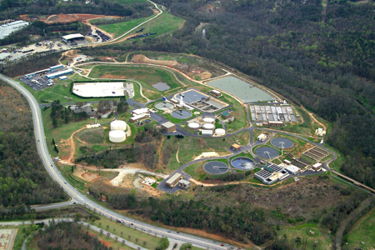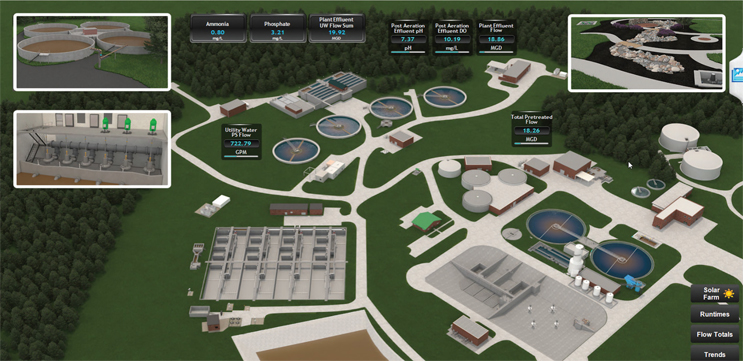Forward-Thinking Utility Knows The Value Of Advanced Technology
By Cody P. Bann

Renewable Water Resources looks to remote alarm notification software to improve efficiency and avert problems.
Greenville County, SC, encompasses an area of approximately 795 square miles with a population of over 500,000. The water and wastewater infrastructure servicing the county is intricate and robust, including more than 350 miles of pipe that connect the community and provide for future growth and development.
For almost 100 years, Renewable Water Resources (ReWa) has been responsible for the county’s water and wastewater infrastructure and manages eight water resource recovery facilities (WRRFs). This oversight includes purifying more than 40 million gallons of water per day from homes, businesses, and industries. ReWa also operates 83 pump stations and nine water treatment facilities. Each facility contains a self-sufficient water treatment process with onsite power generation and sometimes thousands of gauges, flow meters, and storage tanks, depending on the facility size.
Since 2002, ReWa has relied on AVEVA’s System Platform supervisory control and data acquisition (SCADA) system integrated with WIN-911 remote alarm notification software to monitor the system and alert the team about any abnormal operating conditions. This involved a complicated process of the SCADA system calling a mobile phone; from there, operators would stop work to answer the call, then input a unique identification number, and then enter an acknowledgement. This process could take up to one minute. While this doesn’t seem very long, this is critical time lost during possible emergencies. Additionally, since these alarm notifications were transmitted via cell phones, if the operator was in a part of the facility without good cell service, the call might break up and the entire identification input process would have to be repeated.
Upgrading Technology
In 2020 ReWa, WIN-911, and MR Systems, the systems integrator company ReWa partners with to implement technology, identified opportunities to improve the WRRF’s alarming systems by deploying a streamlined, technologically advanced mobile solution. Tony Jones, ReWa business analyst, reached out to Edward Noyes, application engineer with MR Systems. Jones worked closely with Noyes, who listened to Jones’ concerns and designed a system that met ReWa’s high security requirements, improved the ease and efficiency with which operators can monitor and action SCADA alarms, and deployed a proactive monitoring system to notify ReWa technology personnel in the event of a system issue.
The resulting mobile app enables efficient plant operations by giving operators the ability to monitor and act on SCADA alarms via mobile devices with redundant voice and text callouts as needed. Additionally, it complements ReWa’s mission of supporting wastewater treatment through the use of innovative solutions that promote operational efficiency and reinforce the core values of safety and unity.
“While we’ve only been using the mobile app for six months, the team has quickly adapted to working with the more efficient and robust system. They no longer waste time punching in identification codes or depending on intermittent cell service to acknowledge an alarm,” commented Jones.
Faster response times are critical since many alarms involve lost power. In these situations, every minute counts to get an alarm message to the team, which could mean the difference between restarting the generator or experiencing an overflow.

AVEVA interface
Secure Monitoring
The types of alarms that are monitored include critical functions — pumps, UV disinfecting systems, generators, and utility power — that can stop a process and result in a sewer overflow or discharged untreated water. To ensure the systems’ integrities aren’t compromised, it’s critical to use the most secure architecture possible. To that end, Noyes and the MR Systems team implemented intercomponent encryption in conjunction with a custom-built proactive monitoring system that detects whether WIN-911 and AVEVA are communicating and notifies designated personnel of any issues. Additionally, the app’s integration with the SCADA system offers ReWa another layer of security.
Making A Difference
This proactive and perpetual monitoring routinely averts problems. However, in the event that any of the equipment is not operating properly, interactive alerts are sent to the ReWa team via the mobile app, phone call, email, or text. One such instance occurred when the team received an alarm related to a power outage at one of the WRRFs.
A newly installed generator did not automatically start during a power failure, and WIN-911 alerted the technology staff, who then began a dialogue with the operations team via the mobile app’s chat feature. Because of this early and real-time intervention, ReWa assessed the problem and determined that the generator wasn’t properly wired, avoiding additional problems that an extended power loss would have caused.
“Prior to this upgrade, ReWa functioned in a reactive mode and waited until the WIN-911 software notified the operations team there was an issue. Now, we have completely changed this mindset and become more efficient. The IT team knows there is a system problem long before the operations team,” added Jones.
The Future
Named a Utility of the Future by the National Association of Clean Water Agencies (NACWA), ReWa is committed to enhancing the area’s quality of life through the quality of its waterways. Using advanced technology such as the AVEVA System Platform and WIN-911 mobile app helps the team keep that commitment.
“This is a journey, and as a forward-thinking early adopter, ReWa continues to explore technology that allows us to improve infrastructure and operating efficiencies,” said Jones.
About The Author
 Cody P. Bann is director of engineering at Austin, TX-based WIN-911 and may be reached at cody.bann@win911.com. The company helps protect over 19,000 facilities in 85 countries by delivering critical machine alarms via smartphone or tablet app, voice (VoIP and analog), text, email, and in-plant announcer, reducing operator response times, system downtime, and maintenance costs. For more information, visit www.win911.com/.
Cody P. Bann is director of engineering at Austin, TX-based WIN-911 and may be reached at cody.bann@win911.com. The company helps protect over 19,000 facilities in 85 countries by delivering critical machine alarms via smartphone or tablet app, voice (VoIP and analog), text, email, and in-plant announcer, reducing operator response times, system downtime, and maintenance costs. For more information, visit www.win911.com/.
